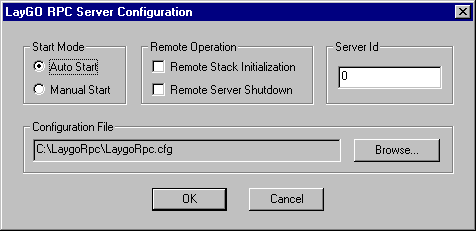
laygorpc packages the LayGO RPC Server as a Windows NT service. It provides a graphical user interface which allows the user to install, configure and uninstall the service. However, laygorpc runs as a service, so it can provide access to clients even when no one is logged in. It has no user interface while running, although it may post messages to the Windows NT Event Log if it encounters error conditions.

To install the laygorpc service, create a directory on the hard drive (c:\laygorpc, by default) and copy laygorpc.exe and its configuration file (laygorpc.cfg, by default) to it. After installation is complete, the operating system will expect to find these files in that directory. Then open a command prompt window, change directories to the installation directory and enter:
> laygorpc -i
The LayGO RPC Server Configuration dialog (shown above) will appear. Choose the settings you want and click . A message will be printed to the command prompt window saying whether the installation was successful or not. If the installation was successful, reboot the system.
Of course, the system RPC libraries and the LayGO devices driver and protocol stack libraries must be installed on the same system.
As a Windows NT service, laygorpc will normally be started automatically by the Service Manager when the system boots. The service can be started or stopped or its startup option changed using the Services applet in the Control Panel. The service can also be started or stopped by entering:
C:\> net start laygorpc
or
C:\> net stop laygorpc
at the command prompt.
laygorpc may also be run at the command-line. The command-line syntax for laygorpc is:
laygorpc [ -c | -i | -u ]
Command-line options are case sensitive. If no command-line option is given, laygorpc will attempt to start the service.
| Command-Line Options | |
|---|---|
| [ -c ] | Configure a previous installation of laygorpc. |
| [ -i ] | Install laygorpc to a new system. |
| [ -u ] | Uninstall laygorpc from the system. |
Use the LayGO RPC Server Configuation dialog to enable or disable automatic startup, remote stack configuration and shutdown and to set the server's stack number and stack configuration file. The service must be restarted before any changes will take effect.